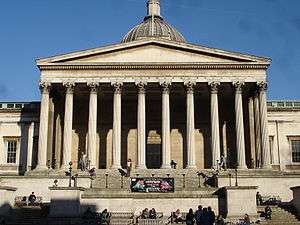UCL Jill Dando Institute
| Established | 2001 |
|---|---|
| Director | Professor Richard Wortley |
| Location | London, United Kingdom |
| Website | UCL Jill Dando Institute of Security and Crime Science |
The UCL Jill Dando Institute of Security and Crime Science (informally the Jill Dando Institute or the JDI) is an institute of crime science located in London, United Kingdom and a part of University College London (UCL). It was founded in 2001, becoming the first university institute in the world devoted specifically to crime science.[1]
The Institute's current Director is Professor Richard Wortley.[2]
History

In April 1999 the broadcaster Jill Dando was murdered outside her home in west London.[3] Her colleague Nick Ross proposed a memorial to her in the form of a new university institution in her name.[3] Ross had already conceived of crime science as a new discipline which distinguished itself from criminology by focusing on crime prevention, scientific methodology and multidisciplinary approach. He and Dando's fiancé, Alan Farthing, established the Jill Dando Fund with the help of the Metropolitan Police Commissioner Sir John Stevens, The Countess of Wessex, and her family and friends.[3]
On 15 March 2000 the Jill Dando Fund was launched in London at Claridge's hotel, followed by the launch of the Jill Dando Fund Appeal on 12 September 2000. The appeal raised £1.5 million and UCL was selected to host the Jill Dando Institute of Crime Science.[3] Professor Gloria Laycock, OBE was appointed as the first Director of the Institute in January 2001.[1] The Institute was opened on 26 April 2001, the second anniversary of Jill Dando's murder, when Prof Laycock gave her inaugural speech as Director.[4][5]
In May 2004 the Institute established new scholarships for its MSc in crime science.[6] In 2005 a Security and Crime Science Centre was established at the Institute to work with industry partners in creating new approaches to counter terrorism. In the same year the International Crime Science Network was established.[7] The Institute published research in May 2006 which showed that the UK and France are perceived to have the worst problems with anti-social behaviour in Europe.[8][9] The Centre for Security and Crime Science opened in October 2006.[10]
In 2009 UCL established the Department of Security and Crime Science as a separate entity from the Institute in order to enable the offering of post-graduate taught and research courses in security and crime science.[11] The Institute continued as a cross-departmental research institute in security and crime science.[11] In September 2009 the Home Office was criticised after it drew up timescales for how long DNA samples should be retained based on research by the Institute that had not yet been finished.[12][13]
Research

The Institute was awarded over £3 million in research and consultancy funding between 2001 and 2007.[14] The Institute has collaborations with psychologists, geographers, economists, physicists, chemists, computer scientists, and biologists as well as designers and town planners.
Research at the Institute primarily takes place within the following groupings:[14]
- Crime Mapping Centre
- Designing Out Crime Group
- Crime Policy and Evaluation Group
See also
References
- 1 2 "Director of Jill Dando Institute appointed". Times Higher Education. 5 January 2001. Retrieved 31 October 2010.
- ↑ "Academic Staff". UCL Jill Dando Institute of Security and Crime Science. Retrieved 31 October 2010.
- 1 2 3 4 "Jill Dando Fund". UCL Jill Dando Institute of Security and Crime Science. Retrieved 31 October 2010.
- ↑ "In the news: Gloria Laycock". Times Higher Education. 27 April 2001. Retrieved 31 October 2010.
- ↑ Cunningham, John (10 January 2001). "The appliance of science to crime control". London: The Guardian. Retrieved 14 October 2010.
- ↑ McCann, Grace (20 May 2004). "Postgraduate: crime science; distance learning; canine stress; urban foxes". London: The Independent on Sunday. Retrieved 31 October 2010.
- ↑ "Frequently asked questions". UCL Centre for Security and Crime Science. Retrieved 31 October 2010.
- ↑ "Bad behaviour 'worst in Europe'". BBC News. 8 May 2006. Retrieved 31 October 2010.
- ↑ "U.K. Has Worst Anti-Social Behavior Problem in Europe". Bloomberg. 9 May 2006. Retrieved 31 October 2010.
- ↑ Morelle, Rebecca (12 October 2006). "Air passengers 'could be tagged'". BBC News. Retrieved 31 October 2010.
- 1 2 "About Us". UCL Jill Dando Institute of Security and Crime Science. Retrieved 31 October 2010.
- ↑ Whitehead, Tom (25 September 2009). "Incomplete research sparks fresh DNA row". London: The Telegraph. Retrieved 31 October 2010.
- ↑ "DNA storage proposal 'incomplete'". BBC News. 25 September 2009. Retrieved 31 October 2010.
- 1 2 "Research and Consultancies". UCL Jill Dando Institute of Security and Crime Science. Retrieved 31 October 2010.
External links
Coordinates: 51°31′29″N 0°07′47″W / 51.524853°N 0.129594°W